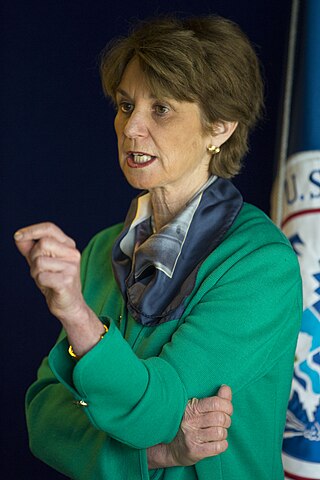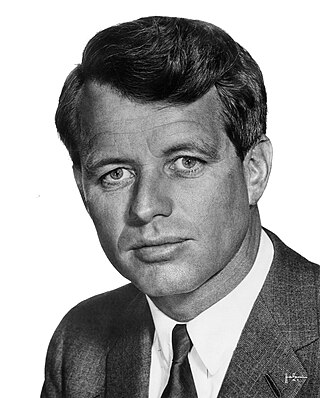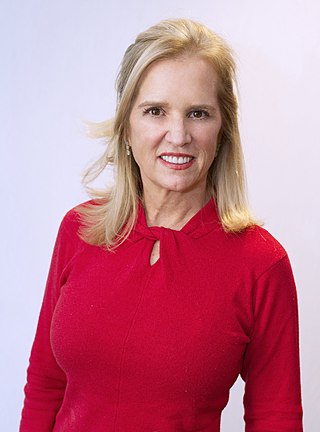Law of nature or laws of nature may refer to:

Vincent T. Bugliosi Jr. was an American prosecutor and author who served as Deputy District Attorney for the Los Angeles County District Attorney's Office between 1964 and 1972. He became best known for successfully prosecuting Charles Manson and other defendants accused of the Tate–LaBianca murders that took place between August 9 and August 10, 1969.

Earth in the Balance: Ecology and the Human Spirit is a 1992 book written by Al Gore, published in June 1992, shortly before he was elected Vice President in the 1992 presidential election. Known by the short title Earth in the Balance, the book explains the world's ecological predicament and describes a range of policies to deal with the most pressing problems. It includes a proposed "Global Marshall Plan" to address current ecological issues.

Ethel Kennedy is an American human rights advocate. She is the widow of U.S. senator Robert F. Kennedy, a sister-in-law of President John F. Kennedy, and the sixth child of George and Ann Skakel. Shortly after her husband's assassination in 1968, Kennedy founded the Robert F. Kennedy Center for Justice and Human Rights, a non-profit charity working to reach his goal of a just and peaceful world. In 2014, she was awarded the Presidential Medal of Freedom by President Barack Obama. She is the oldest living member of the Kennedy Family.

Kathleen Hartington Kennedy Townsend is an American attorney who was the sixth lieutenant governor of Maryland from 1995 to 2003. She ran unsuccessfully for governor of Maryland in 2002.

Robert Francis Kennedy Jr., also known by his initials RFK Jr., is an American politician, environmental lawyer, anti-vaccine activist, and conspiracy theorist. He is the chairman and founder of Children's Health Defense, an anti-vaccine advocacy group that is a leading proponent of COVID-19 vaccine misinformation, and an independent candidate in the 2024 United States presidential election. A member of the Kennedy family, he is a son of the U.S. attorney general and senator Robert F. Kennedy, and a nephew of the U.S. president John F. Kennedy and the senator Ted Kennedy.
The wise use movement in the United States is a loose-knit coalition of groups promoting the expansion of private property rights and reduction of government regulation of publicly held property. This includes advocacy of expanded use by commercial and public interests, seeking increased access to public lands, and often opposition to government intervention. Wise use proponents describe human use of the environment as "stewardship of the land, the water and the air" for the benefit of human beings. The wise use movement arose from opposition to the mainstream environmental movement, claiming it to be radical.
Bobby or Bobbie may refer to:
Jane Akre is an American journalist best known for the whistleblower lawsuit by herself and her former husband, Steve Wilson, against Fox station WTVT in Tampa, Florida. Akre and Wilson are featured in the 2003 documentary film The Corporation which includes a section about the same lawsuit.
Robert F. Kennedy (1925–1968) was an American politician who is often referred to by his initials RFK.
Natural law is law that exists independently of the positive law of a given political order, society or nation-state.

Skyhorse Publishing, Inc. is an American independent book publishing company founded in 2006 and headquartered in New York City, with a satellite office in Brattleboro, Vermont.
The John F. Kennedy assassination and the subsequent conspiracy theories surrounding it have been discussed, referenced, or recreated in popular culture numerous times.

Crimes Against Nature: How George W. Bush and His Corporate Pals Are Plundering the Country and Hijacking Our Democracy a 2004 book by Robert F. Kennedy Jr. about George W. Bush.

On June 5, 1968, Robert F. Kennedy was shot by Sirhan Sirhan at the Ambassador Hotel in Los Angeles, California, and pronounced dead the following day.

Sirhan Bishara Sirhan is a Palestinian-Jordanian man who assassinated Senator Robert F. Kennedy Sr., a younger brother of American president John F. Kennedy and a candidate for the Democratic nomination in the 1968 United States presidential election. On June 5, 1968, Sirhan shot and mortally wounded Robert Kennedy, who died the next day. The circumstances surrounding the attack, which took place five years after his brother's assassination, have led to numerous conspiracy theories.

Robert Francis Kennedy, also known by his initials RFK, was an American politician and lawyer. He served as the 64th United States attorney general from January 1961 to September 1964, and as a U.S. senator from New York from January 1965 until his assassination in June 1968, when he was running for the Democratic presidential nomination. Like his brothers John F. Kennedy and Ted Kennedy, he was a prominent member of the Democratic Party and is an icon of modern American liberalism.
Robert F. Kennedy Human Rights is an American 501(c)(3) nonprofit human rights advocacy organization. It was named after United States Senator Robert F. Kennedy in 1968, a few months after his assassination. The organization of leading attorneys, advocates, entrepreneurs and writers is dedicated to a more just and peaceful world, working alongside local activists to ensure lasting positive change in governments and corporations. It also promotes human rights advocacy through its RFK Human Rights Award, and supports investigative journalists and authors through the RFK Book and Journalism Awards. It is based in New York and Washington, D.C.

Mary Kerry Kennedy is an American lawyer, author and human rights activist. She is the seventh child of Robert F. Kennedy and Ethel Skakel Kennedy. She is the president of Robert F. Kennedy Human Rights, a non-profit human rights advocacy organization.
Robert F. Kennedy's Law Day Address was delivered on May 6, 1961 to the students of the University of Georgia School of Law in Athens, Georgia. It was his first official speech as United States Attorney General outside the capital, and the first endorsement of the civil rights movement by the Kennedy administration. Kennedy used most of the address to talk about civil rights and how he planned to enforce them. He placed a heavy emphasis on the rule of law and the example the United States would be setting for the international community in the face of communism. Kennedy had spent a substantial amount of time preparing for the speech, which ultimately distracted him from the Freedom Rides that would test his resolve to ensure civil rights in its immediate aftermath.










